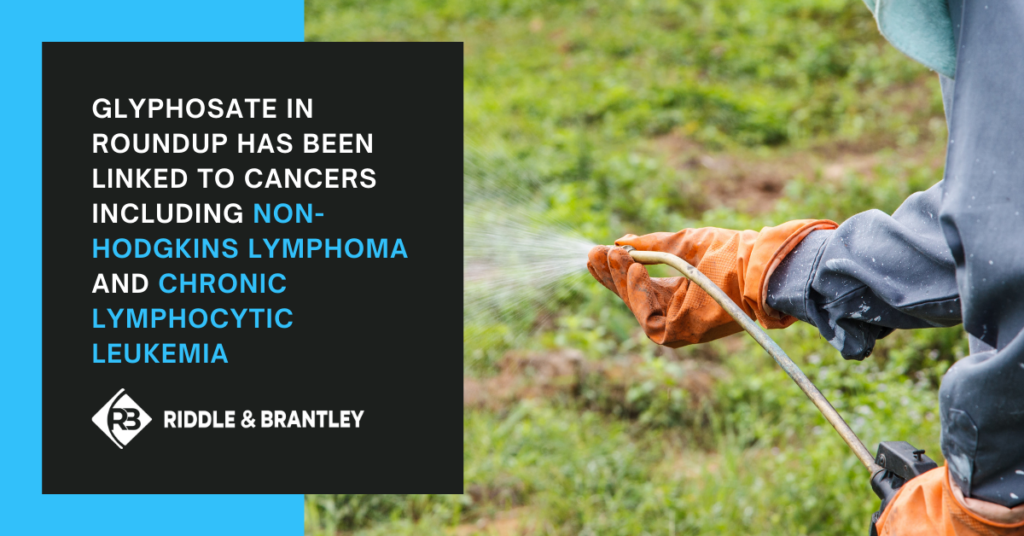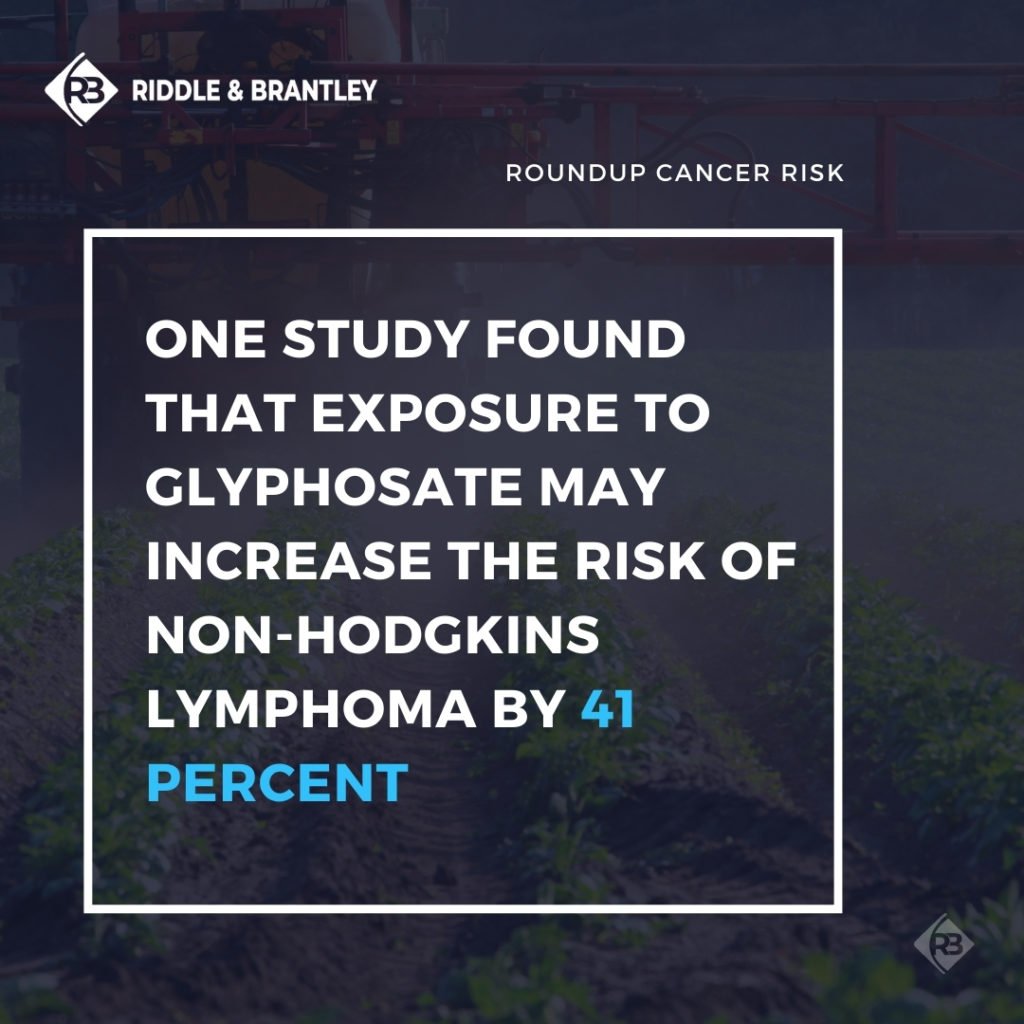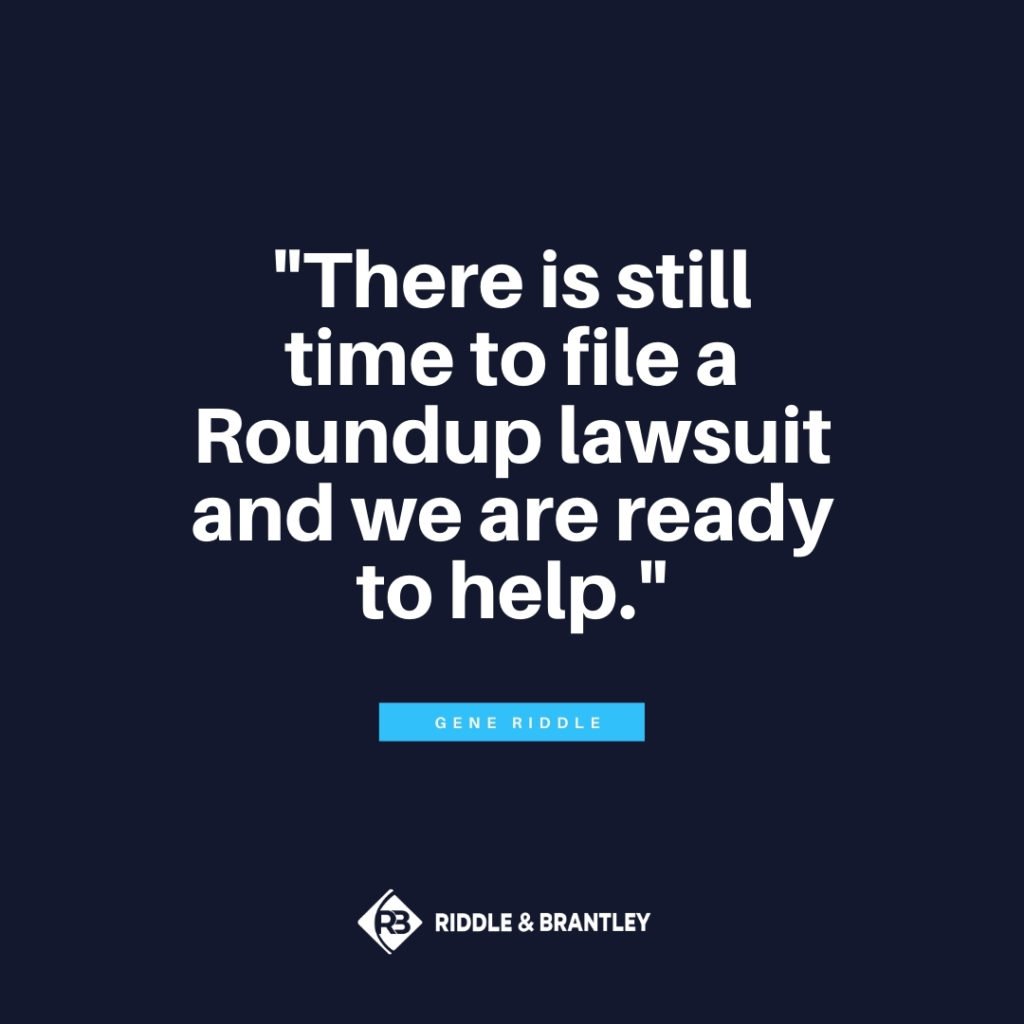The weed killer Roundup contains glyphosate, a chemical that has been linked to various types of cancer, including non-Hodgkins lymphoma, and chronic lymphocytic leukemia (CLL). Roundup manufacturer Bayer faces thousands of Roundup lawsuits alleging that the popular weed killer causes cancer, however the company strongly denies these allegations.
Types of cancer that Roundup (glyphosate) may cause include:
- Non-Hodgkins lymphoma (NHL)
- Chronic lymphocytic leukemia (CLL)

There is a significant amount of scientific research that suggests that Roundup causes non-Hodgkins lymphoma and chronic lymphocytic leukemia (CLL). Research concerning Roundup’s possible connection to other types of cancer is limited. However, other types of cancer potentially caused by Roundup (glyphosate) include B-cell lymphoma, multiple myeloma, breast cancer, brain cancer, and lung cancer.
IMPORTANT: While most Roundup lawsuits have already settled (or are in settlement negotiations), there is still time to file a Roundup claim provided the case meets certain criteria. If you or a loved one has been diagnosed with non-Hodgkin's lymphoma or chronic lymphocytic leukemia after exposure to Roundup, please call 1-800-525-7111 today for a free consultation.
The Link Between Roundup and Cancer
While the use of Roundup is still allowed by the Environmental Protection Agency (EPA) in the United States, the World Health Organization’s International Agency for Research on Cancer (IARC) classifies glyphosate as “probably carcinogenic,” meaning that it probably causes cancer in humans.
Non-Hodgkins Lymphoma and Roundup (Glyphosate)

Despite Bayer’s strong denials, the evidence that Roundup potentially causes non-Hodgkins lymphoma is increasingly strong. In one recent analysis, scientific researchers determined that high exposure to glyphosate (the chemical in Roundup) increases the risk of developing non-Hodgkins lymphoma by 41 percent.
In the analysis, researchers concluded, “Our current meta-analysis of human epidemiological studies suggests a compelling link between exposures to GBHs [glyphosate-based herbicides] and increased risk for NHL.”
A separate 2014 study that reviewed three decades of research on glyphosate and non-Hodgkins lymphoma determined that those exposed to glyphosate (the ingredient in Roundup) may have increased risk of developing NHL.
Similarly, the US Department of Health and Human Services’ Agency for Toxic Substances and Disease Registry (ASTDR) has concluded that “numerous studies reported risk ratios greater than one for associations between glyphosate exposure and risk of non-Hodgkins lymphoma or multiple myeloma.”
Many countries have banned the use of glyphosate based on its potential links to non-Hodgkins lymphoma and other cancers. These countries include France, Italy, Denmark, Thailand, Vietnam, Qatar, and more.
Chronic Lymphocytic Leukemia and Roundup
According to Dr. William Weirda, director of leukemia at the MD Anderson Cancer Center, “Based on the available data that we have and the correlations, it does seem that there is an association between exposure to herbicides … and increased risk for developing chronic lymphocytic leukemia.”
Chronic lymphocytic leukemia, otherwise known as CLL, is a “slow-growing” or “indolent” form of cancer. Many doctors consider CLL to be a type of non-Hodgkin lymphoma, or NHL.
Was Your Cancer Caused by Roundup?
If you believe your cancer was caused by exposure to Roundup weed killer, you may be entitled to compensation and qualify for a Roundup lawsuit.
“Do I Qualify for a Roundup Lawsuit?”
If your non-Hodgkins lymphoma or chronic lymphocytic leukemia was potentially caused by Roundup, you deserve justice — and it is not too late to file a Roundup lawsuit.
You may qualify for a Roundup lawsuit if you meet the following criteria:
- You used Roundup either commercially or residentially
- You used Roundup for a prolonged period of at least 2 years
- Your exposure to Roundup was after 1990
- You received a subsequent diagnosis of a form of Non-Hodgkin’s Lymphoma (NHL) or Chronic Lymphocytic Leukemia (CLL)
- In death cases, the date of death must be within the last ten years

Bayer recently negotiated a global settlement with thousands of Roundup plaintiffs totaling more than $10 billion, but there is still time to file a Roundup lawsuit, provided you meet certain criteria.
Don’t wait — it can be difficult to collect evidence, and the longer you wait, the harder it may be to win your case and recover compensation for you.
For a FREE consultation with an experienced Roundup cancer lawsuit lawyer, please call 1-800-525-7111 or complete the fast and convenient form below.
There is no obligation, and you won’t pay any attorney fees unless we win your case and you receive compensation.
"This settlement changed me and my family's lives."
-Linda B., Riddle & Brantley client
Call 1-800-525-7111 and let’s review your claim.
Since 2000 alone, we’ve recovered more than $600 million in total compensation for victims of negligence, and we’d love to help you however we can (see disclaimer below). Our experienced trial lawyers have been recognized by such prestigious organizations as The National Trial Lawyers Top 100, The National Association for Distinguished Counsel, Multi-Million Dollar Advocates Forum, Super Lawyers, and AV Preeminent by Martindale-Hubbell (see disclaimer below).
We believe Justice Counts and we are ready to help however we can.
IMPORTANT: While most Roundup lawsuits have already settled (or are in settlement negotiations), there is still time to file a Roundup claim provided the case meets certain criteria. If you or a loved one has been diagnosed with non-Hodgkin's lymphoma or chronic lymphocytic leukemia after exposure to Roundup, please call 1-800-525-7111 today for a free consultation.
*** Disclaimer: The results mentioned are intended to illustrate the type of cases handled by the firm. These results do not guarantee a similar outcome, and they should not be construed to constitute a promise or guarantee of a particular result in any particular case. Every case is different, and the outcome of any case depends upon a variety of factors unique to that case.
*** Disclaimer: An attorney must meet certain requirements to join these organizations or receive these awards. For more information on Membership Criteria for Million Dollar Advocates Forum, Multi-Million Dollar Advocates Forum, Super Lawyers, The National Trial Lawyers Top 100, The National Trial Lawyers Top 40 Under 40, The National Association of Distinguished Counsel, AV Preeminent by Martindale-Hubbell, the Litigator Award, and other memberships, awards, and accolades, please visit our Membership Criteria page. These awards and memberships should not be construed as a promise or guarantee of a similar result. Each case is different and must be evaluated separately.